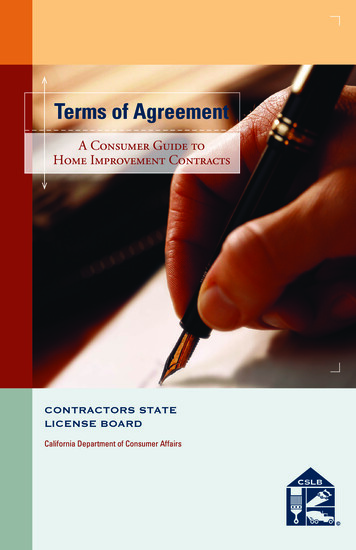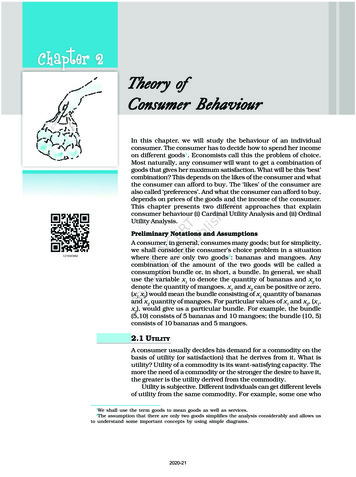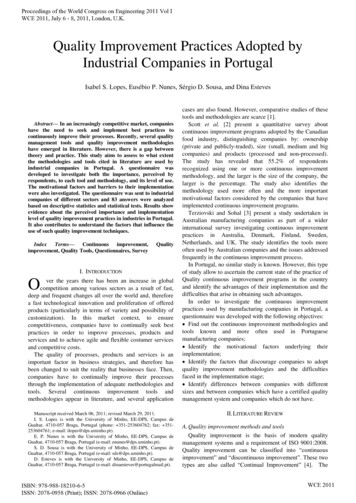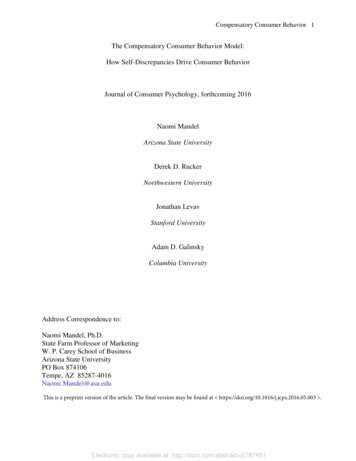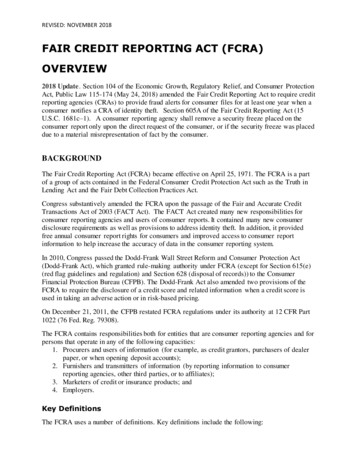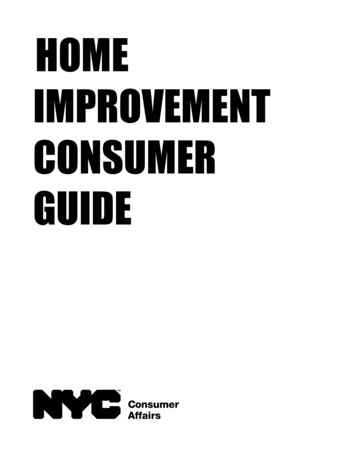
Transcription
HOMEIMPROVEMENTCONSUMERGUIDE
BEFORE .AND AFTER
You need help repairing or renovating your home.For your own protection, there are a few things youshould know before hiring a home improvementcontractor (HIC).WhatcontractorsdoFirst, what is a home improvement contractor?New York City’s Home Improvement Business Law definesa contractor as anyone who “owns, operates, maintains,conducts, controls or transacts a home improvementbusiness” and “undertakes or offers to undertake or agreesto perform any home improvement or solicits any contracttherefor,” whether or not the contractor is a primecontractor or subcontractor.In other words, if you receive an offer to build on, repair,or remodel your home or apartment for a fee, you’redealing with a contractor. Whether you own or rent, or ifthe dwelling is a co-op or a condo, this is the rule.A contractor may be an individual, a company, apartnership, or a corporation.New York City law requires that any person or business thatsolicits, canvasses, sells, performs, or obtains homeimprovement work where all costs (including labor,materials, etc.) come to more than 200 total must get anHIC license from the Department of Consumer Affairs.HOME IMPROVEMENT CONSUMER GUIDE 1
SalespersonsThe City law describes a home improvement salesperson as anyone who “negotiates or offers to negotiate a home improvementcontract” with a property owner, or “solicits or otherwise endeavors to procure in person a home improvement contractfrom an owner on behalf of a contractor, or for himself or herself should the salesperson be also the contractor.”Who needslicensesIf you are solicited to hire a contractor, the salesperson doingthe soliciting needs a Home Improvement Salesperson license.The contractor paying the salesperson must have a Home Improvement Contractor license.If the salesperson is also the contractor, he or she needs boththe Home Improvement Contractor and the Home Improvement Salesperson licenses.[Certain home improvement professionals are licensed by other City or State departments, including electricians, plumbers,architects, engineers, and security alarm installers. For moreinformation, call the Citizen Service Center at 3-1-1.]ContractsWhat is a home improvement contract?A home improvement contract is an agreement by a contractorto work on the residence of a homeowner or tenant.The agreement means the contractor promises the homeowneror tenant to perform all labor and services and to furnish allmaterials specified under the terms of the contract.2 HOME IMPROVEMENT CONSUMER GUIDE
A written contract protects you if your contractor goes out ofbusiness, or if you can show that the contractor did a bad job.Sample contracts are available from the DCA Licensing Center,42 Broadway, Lobby, New York, NY 10004, or online atwww.nyc.gov/dca.Why use alicensedcontractor?License-holders undergo a criminal history check, pass awritten examination, pay a license fee, and post a bond orcontribute to a Trust Fund that gives restitution to consumers.There are thousands of licensed home improvement contractors in New York City. But many contractors work without a license or insurance. Don’t take any chances with your home!A license is no guarantee that a contractor will always engage inproper business conduct. But it gives Consumer Affairs theauthority to act on your behalf.Consumers are often able to get compensation because theyhired a licensed contractor. A DCA Trust Fund, based onmandatory contributions from license-holders, makes thesepayments possible.To find out if a contractor is licensed, call 3-1-1 or go towww.nyc.gov/dca. Make sure you have the name and address ofthe contractor and/or remodeling business.Photos courtesy of NYC Department of Housing Preservation and DevelopmentHOME IMPROVEMENT CONSUMER GUIDE 3
DCALicenseFAQsWho needs a DCA license?Home improvement contractors and salespersons soliciting ordoing more than 200 of home improvement work in NewYork City are required to get a license from the Department ofConsumer Affairs.Can a licensed contractor do any home improvement work?Some home improvement work—such as electrical orplumbing—is restricted to qualified tradespeople licensed by theBuildings Department under separate laws. A DCA homeimprovement license does not authorize a contractor toperform any work or engage in any business activity outsideDCA jurisdiction. (See Page 5 for details.)Do small jobs require a license?A person who performs a job for less than 200 does notrequire a license.What about licenses for home improvement workers who aren’tcontractors?Salespersons working for a contractor require a HomeImprovement Salesperson license. Other employees who workfor a contractor do not require a DCA Home ImprovementContractor license, nor do licensed professionals such asplumbers, electricians, architects, engineers, and security alarminstallers.It is illegal in New York Cityto dry-scrape or sand painted surfaces.Scraping and sanding pose a dangerof lead dust inhalation.4 HOME IMPROVEMENT CONSUMER GUIDE
What the lawcoversWhat kind of work does the City’s Home ImprovementBusiness Law regulate?The law defines home improvement as the construction,repair, replacement, remodeling, alteration, conversion,rehabilitation, renovation, modernization, improvement,or addition to any land or building, or that part of the landor building used or designed to be used as a residence ordwelling place.The home in home improvement refers to: condo units co-op units rented apartments private buildings with four or fewer residential unitsThis applies to contracts with homeowners who own singleor multiple dwellings of up to four residences, as well astenants, condominium unit holders, and cooperativeshareholders who are making improvements to their apartments (regardless of the number of residences or dwellingunits in the buildings where they reside).Work on any of these counts as home improvement: awnings garages basements landscaping central heating/air conditioning patios central vacuum cleaning system porches communication systems storm windows driveways swimming pools fences terracesLoansarrangedthrough yourcontractor areprohibitedCity law prohibits any home improvement contractor fromacting as an agent for a lender or advertising, promoting,or arranging a home improvement loan. If your contractorhas illegally offered to arrange a loan while negotiating ahome improvement job, call 3-1-1.HOME IMPROVEMENT CONSUMER GUIDE 5
What the lawdoesn’t coverThe activities below are not considered home improvementunder the law: the sale of goods or materials by a seller who is not involved in the contracted work work performed on a residence owned or controlled by agovernment agency the construction of a new home/building or work doneby a contractor when the work is fulfilling a guarantee ofcompletion of a new building project the painting or decorating of a building, residence,home, or apartment, when not incidental or related tohome improvementKnow yourcontractorBefore making a contract, ask about the contractor’s background and professional qualifications. Don’t sign untilyou’re satisfied.Ask the contractor: How long has she or he been in business, and at whataddresses?6 HOME IMPROVEMENT CONSUMER GUIDE
Know yourcontractor Does the contractor subcontract or use in-house staff?At what telephone numbers can you reach the contractorduring an emergency?When will the contractor be on site?How many other jobs does the contractor take on at thesame time?Does the contractor have certifications fromremodeling and contracting industry organizations?(Many experienced and reputable contractors do not joinsuch organizations or seek such certifications. Decide foryourself what credentials you need to see when hiring acontractor.)Check the track record of your home improvementcontractor. Ask the contractor for references, including alist of previous clients. Call them to find out how thecontractor handled their home improvement jobs.To check on the complaint history of a home improvementcontractor, call 3-1-1.HOME IMPROVEMENT CONSUMER GUIDE 7
GetestimatesOne of the best ways to calculate the cost of your homeimprovement work is to get estimates from other contractors.A minimum of three estimates is strongly recommended.Under the Home Improvement Business Law, a homeimprovement contractor must make a written estimate uponrequest and give the customer a copy. The contractor (or anysalesperson, employee, or agent of any remodeler) must tellthe consumer in advance that a written estimate of the cost ofmaterials and labor of the home improvement work isavailable.If a contractor charges for supplying a written estimate, youmust be told beforehand how much the fee will be.If you hire the contractor, the estimated fee should beitemized and included in the total contract price.Use onechecklistWhen you secure bids or estimates, make sure that thecontractors use the checklist of products and designs that isthe same as, or similar to, yours. The more details andspecificity — particularly brand names of products andmaterials — the more accurate the estimate.Include the checklist in the contract, and use it later when youmake a final inspection of the completed work.Pay carefulattentionYou should leave nothing to chance. Specify in completedetail what is covered — and what is not covered — in the termsof your home improvement contract.Every home improvement contract must be written and signedby all parties named. The contractor/salesperson must give theconsumer a completed, legible copy of the contract at the timeof signing and before any work is done.The contract must be written in plain English and any otherlanguage principally used in any oral sales presentation.Contracts negotiated in Spanish must be written in Spanish.8 HOME IMPROVEMENT CONSUMER GUIDE
NecessaryprovisionsUnder the Home Improvement Business Law rules, yourcontract must include certain provisions to protect againstabuses or fraudulent practices by contractors.Add any provisions that will directly affect you if problemsarise, including the checklist that formed the basis of theestimates you solicited.Make sure you include the following provisions: The contractor’s and salesperson’s names, addresses,telephone numbers, and DCA license numbers. The date the parties signed the contract. A payment schedule. If you make progress paymentsduring the course of the work, the contract should showthe amount of each payment, and identify specific workthat will trigger the payments.New York State law requires the contractor to depositprogress payments into an escrow account. A contract provision stating that the contractor mustshow the consumer a valid Certificate of Workers’Compensation Insurance before beginning the work. Any advertised claims, including clearly stated charges,guarantees, or warranties. The approximate dates when work will begin and besubstantially completed. Include a list of any unforeseenevents that would move the completion date, and statewhether the parties agree that a definite completion dateis “of the essence.” Acomplete description of the construction orremodeling work to be done on the premises, a listing ofspecific materials to be used, and the amount of moneyto be paid for work and materials. A “proof of payment” clause to shield you from anyliability if the contractor fails to pay subcontractors orsupply vendors. A “lien waiver” clause. With this, you can withhold finalpayment until the contractor submits proof of paymentto all subcontractors and vendors. This knowledge helpsprevent unpaid subcontractors and vendors fromputting liens on your home.HOME IMPROVEMENT CONSUMER GUIDE 9
Necessaryprovisions What thecontractorMUST tellyouA requirement that the contractor clean the premises afterhe finishes his work.A requirement that the contractor will comply with allapplicable laws, regulations, and codes. A DCA-licensedcontractor must file architectural plans with theDepartment of Buildings and have signed permits beforebeginning home improvement work.A “Cancellation” clause permitting you to cancel within 72hours of signing the contract.THE CONTRACTOR MUST include in boldface type in theprinted contract and in close proximity to the space for thebuyer’s signature, a statement reading:“You, the buyer, may cancel this transaction at anytime prior to midnight of the third business day afterthe date of this transaction.”THE CONTRACTOR MUST notify you that you have 72hours to cancel a remodeling contract after signing. This isimportant. This three-day “cooling off” time must bementioned in the contract, verbally to you, and in a separate“Notice of Cancellation” form.THE CONTRACTOR MUST furnish the consumer twocopies of a separate and completely filled out “Notice ofCancellation” form at the time the contract is signed.This form must be attached to the contract and contain inboldface type the contractor’s name and address, the date ofthe transaction, and the last date on which the consumer maygive notice of cancellation. (Be sure to confirm yourcancellation in writing and send it by certified mail.) It alsoincludes the rights and duties of the consumer and contractorat cancellation.THE CONTRACTOR MUST verbally inform the consumerabout his or her right to cancel at the time of contract signing.10 HOME IMPROVEMENT CONSUMER GUIDE
Canceling acontractThe contractor must honor any valid notice of cancellation.Within ten business days after receipt of notice,THE CONTRACTOR MUST: Refund all payments made under the contract. Cancel and return any negotiable instrument executed bythe consumer in connection with the contract. Terminate any security interest. Notify the consumer whether the contractor intends torepossess or abandon any shipped or delivered materials.Changingplans?Put it inwritingChanges or modifications to the original home improvementwork sometimes become necessary while the work is underway.If this situation should arise, a consumer should be sure to putall work and financial changes in writing.Have this document signed by both the contractor andconsumer. Never rely on verbal agreements.TakingchargeAre you prepared to take control, and keep control, of thework that you are paying for? Home improvement andremodeling jobs can be overwhelming. Follow these steps: If you cannot be on your premises at all times, arrange forsomeone you trust to be home while the work is in progress.The supervisor should be sure the materials and the fixturesare examined before they are installed, and check the workat each step. Point out shoddy work to the contractor immediately andsee that it’s corrected before the work proceeds. When remodeling, never pay the bulk of your total projectprice up front. Try to reserve the majority of the balancedue upon completion of the job and upon your approval. The more money you hold back, the more power you’llpossess in your dealings with the contractor.HOME IMPROVEMENT CONSUMER GUIDE 11
TakingchargeFilingcomplaintswithConsumerAffairs If you can pay with a credit card, you’ll be affordedadditional protection under the Federal Fair Credit Act ifproblems arise. Take time to inspect all the work, and do it when thecontractor is not looking over your shoulder awaiting thefinal check. Look at every detail of the project when you arecomfortable and relaxed. During your inspection, use thechecklist you prepared when you first solicited estimates. Remember, once you hand over the check, you may neversee the contractor again. Make sure any defects you find are fixed before you handover final payment. Do not sign a Completion Certificateuntil all work has been completed to your satisfaction.If you are dissatisfied with a remodeling job and thecontractor is unwilling to correct problems, file a complaintwith the DCA. Visit www.nyc.gov/dca to use an electronicform, or call 3-1-1.Your complaint should include a complete description of theproblem, and the name, address, telephone number, andlicense number of the contractor. Be sure to furnish theagency with copies (never send originals) of relevantdocuments, including: contracts photographs of the work performed guarantees warranties advertisements cancelled checks (both front and back) showing proof ofpayment12 HOME IMPROVEMENT CONSUMER GUIDE
Whenwrongscan’t beput rightDCA will investigate your complaint and try to mediate yourdispute with the contractor. In many cases a telephone callfrom our office is all that is necessary to settle the matter.When voluntary resolution cannot be accomplished, anadministrative hearing will be held and an administrative lawjudge will hear the case.If the hearing results in an administrative order compellingthe contractor to make restitution, the contractor will have tocomply with the judgment.If the contractor fails to meet this obligation, DCA will moveto revoke his or her license and seek restitution on yourbehalf from the former licensee’s bond, or by invading theHome Improvement Contractor Trust Fund.HICTrust FundDCA’s HIC Trust Fund was established as a restitution fundfor consumers who have used a licensed contractor, but foundthe contractor did shoddy or substandard work andsubsequently went out of business.DCA can reimburse aggrieved homeowners from the HICTrust Fund but only if: the homeowner hired and paid alicensed contractor; the licensed contractor contributed tothe Trust Fund during the relevant license period; anadministrative law judge determines that the contractorviolated the law causing the homeowner to suffer monetarydamages; and the licensed contractor cannot be located ormade to pay.Contractors who are applying for a license must pay 200into the Trust Fund or post a bond. An additional payment of 200 dollars is required every two years when the license isrenewed. By paying into the Trust Fund, contractors are savedthe expense of obtaining a bond. By making sure that they areproperly licensed, contractors have greater recourse to defendthemselves from false claims or when a client refuses to pay upwhen the job is done.HOME IMPROVEMENT CONSUMER GUIDE 13
The New York City Department of Consumer Affairs protects and enhances the dailyeconomic lives of New Yorkers to create thriving communities.If you have a consumer-related complaint, go to www.nyc.gov/dca, contact 311 (212-NEW-YORK outside NYC), or write:New York City Department of Consumer Affairs42 BroadwayNew York, NY10004-1617If you have a consumer-related complaint, call DCA at 311 or (212) NEW-YORK.New York City employees are not allowed to ask for or accept anything of value, such asmoney, gifts, or tips for doing their job. To report corruption, contact the New YorkCity Department of Investigation at www.nyc.gov/doi.
the soliciting needs a Home Improvement Salesperson license. The contractor paying the salesperson must have a Home Im-provement Contractor license. If the salesperson is also the contractor, he or she needs both the Home Improvement Contractor and the Home Improve-ment Salesperson licenses. [Certain home improvement professionals are licensed .

